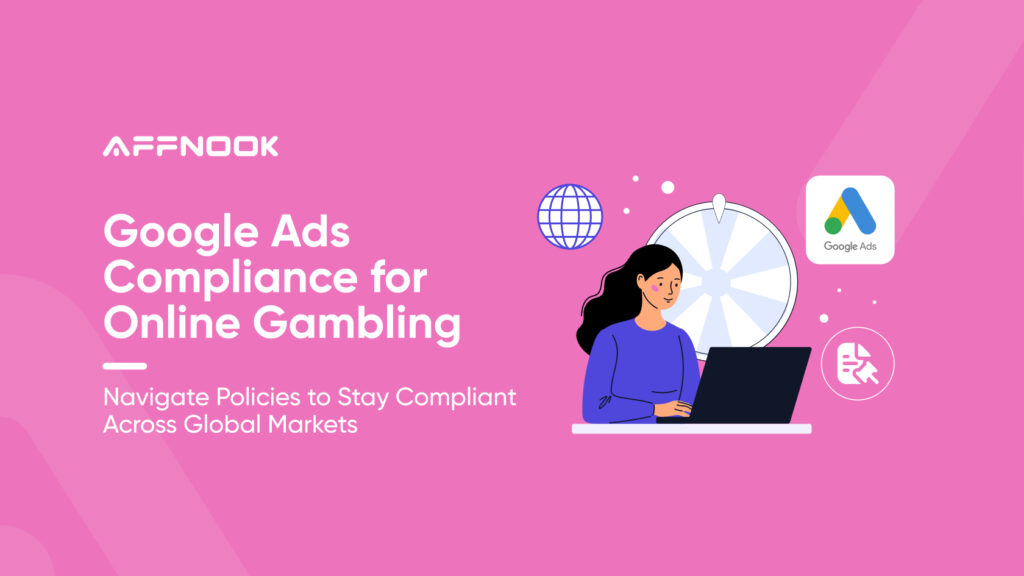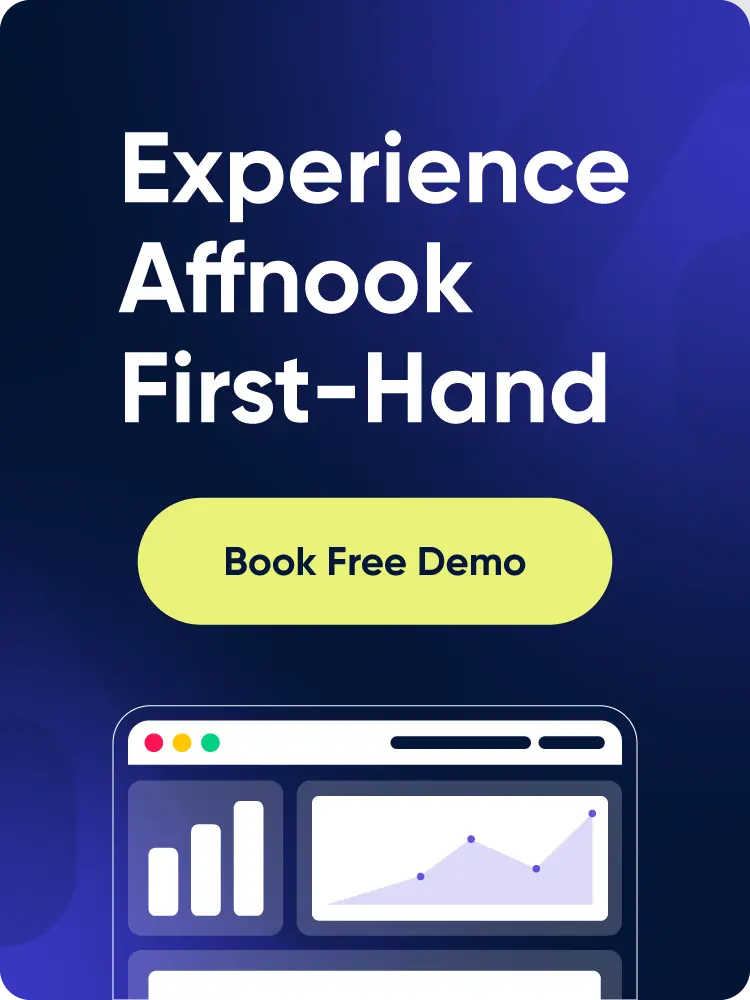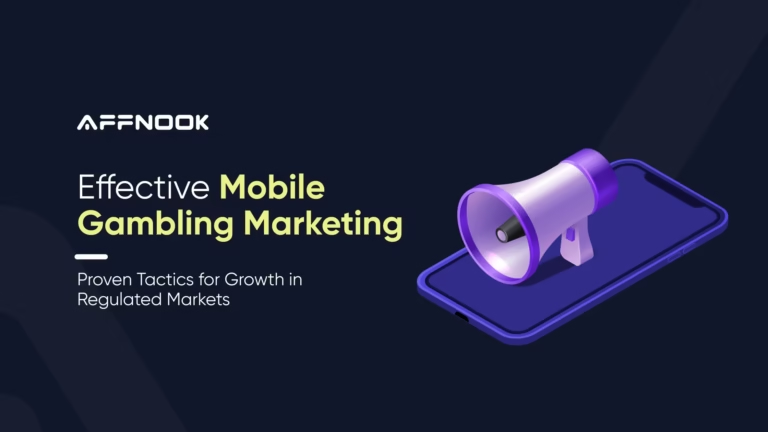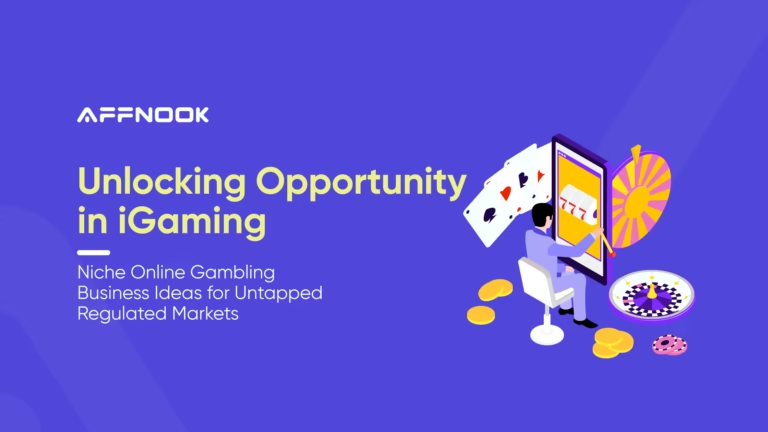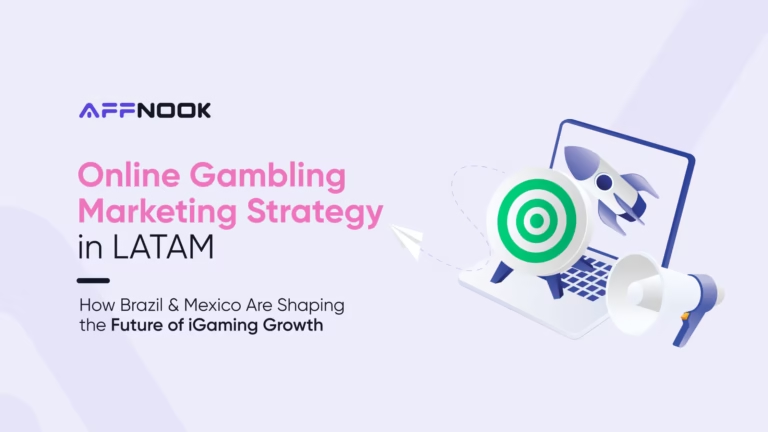90% of internet users come into contact with Google ads — brushing past the ad running behemoth in their navigation of the interwebs.
That’s a big percentage. But what does it mean in number terms?
As per 2025 reports, over 5.56 billion individuals were already using the internet, as per a Meltwater and we are social report. So, we’re looking at a minimum of 5.004 billion people, who are coming into contact with the content being floated through the Google ads platform.
Roughly half the world’s population can be part of your targeting pool.
If you’re aiming to stick strictly to existing gamblers — assuming at least half are on the internet — you’re looking at about 500 million people by 2090.
It’s clear: Google ads provide unprecedented reach, no matter which industry you’re part of. When it comes to niche zones of operations, the advantage is perhaps even more evident. That’s why the paid marketing department within your operation or brand must have a competent strategy in place — that sifts through the platform’s policy roadblocks.
Continue reading to get a complete map of the obstacles affecting the running of online gambling google ads.
What do Google Ads’ Policies Say About iGaming Content?
The policy laid down for advertising iGaming covers only two areas, namely, ‘gambling’ and ‘gambling-promoting content’. There are two aspects to permissions under both headers covering:
- The ads themselves
- The destination for the ads (i.e., landing pages or websites)
Both these aspects should adhere to three basic rules, as per Google:
- They should be directed only towards approved countries.
- The associated landing page should display information regarding responsible gambling.
- None of the content shared should target minors.
Now that the basic stipulations are out of the way, let’s understand what is classified as ‘gambling’ and ‘gambling-promoting content’ under Google ads’ policies.
Understanding ‘Gambling’
The following functional format used in any aspect is qualified as ‘gambling’ in Google’s advertising policy:

But this isn’t all. The scope of this definition is much broader.
It also includes the local legal regulations for the country or countries you’re targeting, and what they consider as ‘gambling’ — an understanding which is likely to be regionally varied, and therefore, much more expansive in scope.
There’s also a clear caveat stated within the policy regarding promotions on prizes, or bonuses. Brands and operators of social casinos can utilize them under this policy’s parameters. However, all other types of service providers fall “out of scope” of the policy. In simple terms, it isn’t allowed.
Understanding ‘Gambling-promoting Content’
Under the online gambling google ads policy, content promoting this industry is classified in two manners:
- Any communication which openly encourages viewers to participate in online gambling or related activities, and
- Any kind of gambling activity which requires prior or explicit permission from the local authorities.
What’s more? Promotions, irrespective, are not a direct process. Even in permitted countries, you’re first going to need a certification from Google to promote your services on their ad serving platform.
Beyond this, Google has classified permitted gambling formats which can be advertised. This regulation differs by country. So it is possible that your particular operating niche is not allowed for the country you’re operating in, even if all the business is above ground and completely licensed and regulated.
Are there outliers? Not directly. The policy documents are quite direct on valid advertising and the stuff which is going to get your account a ban.
What can happen, however, is that the advisory undergoes a revision and what was earlier banned, becomes unbanned. There is an example for this from 2025. A complete online gambling Google ads ban was placed in Nigeria in January 2025. Apprehensions arose due to ongoing policy negotiations.
However, by April, these restrictions were lifted from the state of Lagos alone, due to the ‘impractical’ nature of this imposition.
What is Allowed and What is Disallowed?
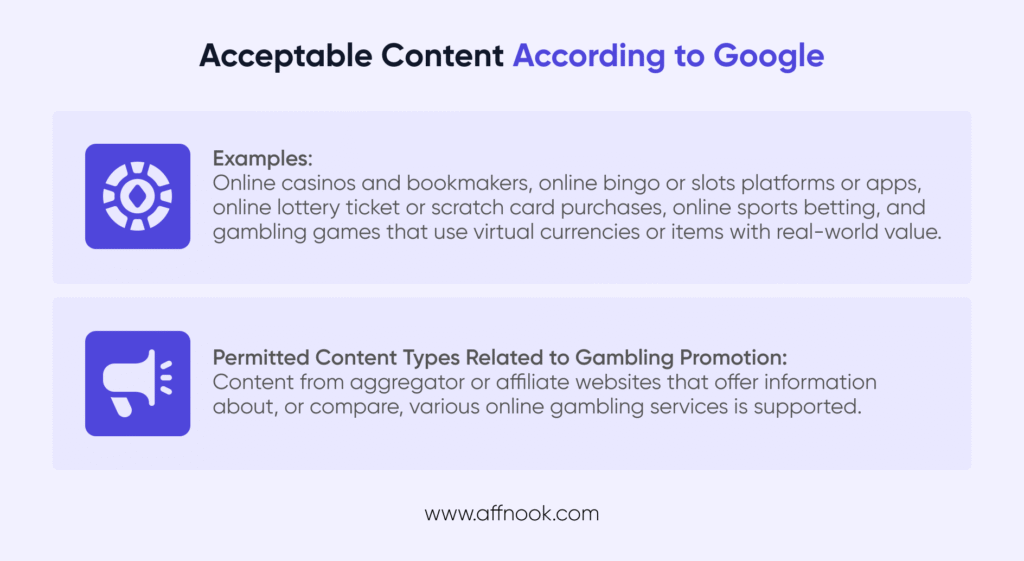
The key to falling within the acceptable norms is to ensure when ads promoting online gambling are run, the destination page does not offer gambling services itself, or be directly linked to a page where gambling services are available right away.
Country-based regulations are infallible, no matter which regions you’re targeting. Google draws a line at respecting the local laws for all manner of iGaming promotion.
Any operator or brand looking to run their campaigns through Google ads must be licensed, and following the stipulations present in the licensing rules. Without due compliance, consider promotions through Google ads next to impossible.
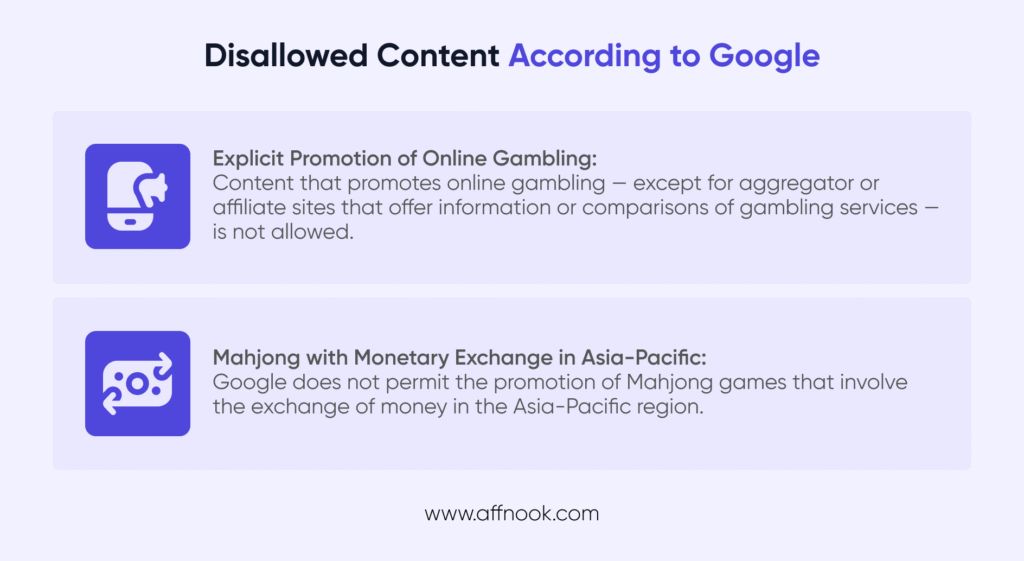
Additionally, the licensing provided for online gambling Google ads is limited in nature. Any business looking to continue their promotions through the medium must continue to possess a valid and ongoing gambling license, registration or authorization.
The moment the government-accepted licensing ceases to exist, Google requires you to inform them. This should be done in either of the three instances:
- License suspension, or
- Termination, or
- Expiry.
Without valid documentation of this nature, your ads account is likely to get suspended until and unless you gain legal operating status once again. When such a change is made, you can once again apply for certification on Google, and begin operating your ads account.
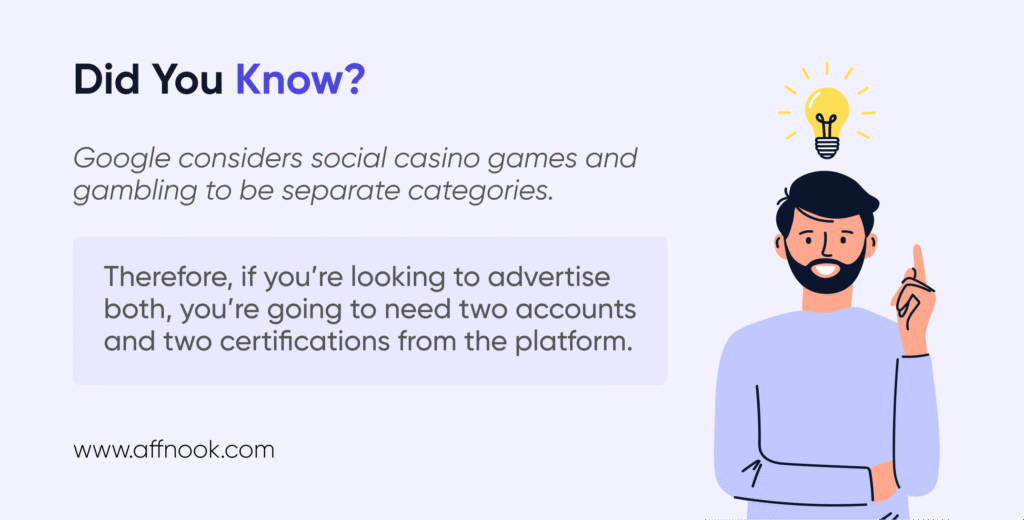
What are the Rules for Social Casinos?
First off, the certification rule applies to social casino games’ promotion as well. The only point of difference is the type of certification required. The forms for this and gambling differ, both in level of information required, and conditions placed on ad runners.
How are social casino games defined by Google?

So how does online gambling Google ads promotion in this case work? Let’s examine what is allowed and what isn’t.
- The unacceptable kind of social casino game promotion includes this:
Any content which directly encourages indulgence in social casino gaming — even through aggregator or affiliate websites — is not allowed at all.
Example: An affiliate website featuring a ‘Top 10 Social Casino Games’ list with direct ‘Play Now’ buttons or highly incentivizing language for multiple social casino apps would likely be disallowed. Similarly, a content hub whose sole function is to review and link directly to various social casino games.
- The acceptable kind of promotion looks like this:
Promotion of actual social casino games. Any association with real-money casinos or other types of activity will earn an account suspension on detection.
Why it is allowed: Direct promotion by the game’s provider can be regulated since promotions will be directed by a singular entity, which makes it easier for Google to enforce its online gambling Google ads rules, while limiting misuse.
Example: A developer like Playtika or Zynga could run Google Ads campaigns directly promoting their ‘Slotomania’ or ‘Zynga Poker’ app, provided they meet all certification requirements and strictly adhere to the “no real-money gambling” association rule.
Other Requirements for Social Casino Games
- Possession of a valid license for the target country.
- All games must have disclaimers that make it abundantly clear that no real-money exchange is going to occur during gameplay and the provider isn’t promoting money-based gambling on their platform.
- Another disclaimer should be placed on all marketing communications to ensure only 18+ aged individuals engage. Warnings for minors should also be clearly placed.
- On both landing page and ad the advertiser needs to share whether in-app purchases are part of gameplay or not.
- No marks, logos or names should be used that are also associated with real money gambling on the ad, landing page or redirected app.
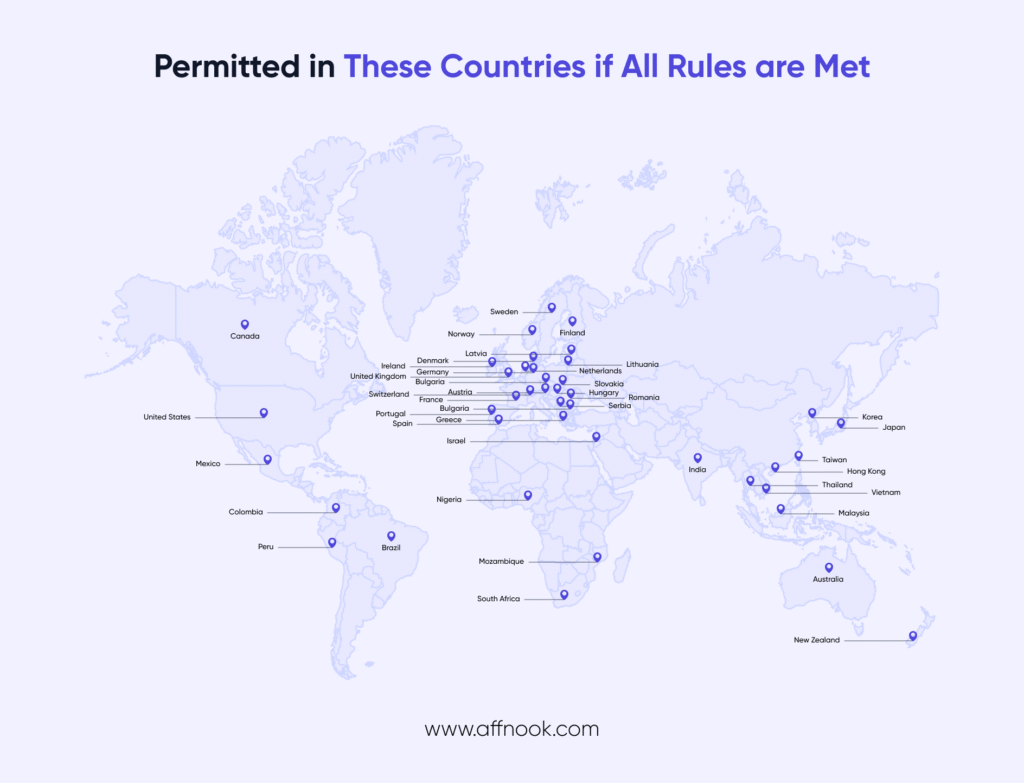
How to Apply for Online Gambling Google Ads Certification?
Start out, make sure you’re well-aware about the policies in place for the country or countries you’re looking to run ads in. Poor alignment here will lead to a lack of success in acquiring certification, no matter how meticulous your documentation is.
The next steps look as such:
- Based on what you’re getting certified to promote — gambling or social casino gaming — apply for the certification within the Google Help Centre. Make sure you read the fields carefully and fill out the complete information required.
- If you’re looking for permission to run ads in more than one country, you’re going to need to fill out multiple forms (one for each country).
- This is the most important aspect to maintain certification: if any of the facts or operational aspects change, you’ll need to get recertified. This means re-filling the form itself and practicing all the steps stated above. If you don’t do this, your online gambling Google ads account is going to be suspended.
Allowed Ad Formats on Google Ads
There are four main types of accepted ad formats for iGaming. However, it is crucial to note that this list is non-exhaustive, and the complete list will be subject to country-wise rules.
- Shopping ads
- Gmail ads
- Reservation display ads
- Google TV masthead ads (This is mostly supported outside the USA. Within the US, only two kinds of promotions are allowed: those of daily fantasy games and sports betting.)
- Youtube masthead ads (Here most online, offline gambling and social casino content is disallowed. Exceptions include:
- Assets related to sports betting in general
- Content pertaining to daily fantasy sports in Canada, USA and India)
However, there are limitations on the ease of execution where ad formats are concerned. Here’s where you might get stuck:
- If your ad format and permitted medium misalign, your ad will automatically be ‘disapproved’.
- Targeting allowed and disallowed countries will get your ad running with the label “eligible (limited)”. It will be served where it’s okay, and will be restricted where it isn’t.
Types of Permitted Online Gambling Google Ads, by Country
Refer to the selected list of countries where Google ads for online gambling are permitted, if you meet the necessary certification requirements.
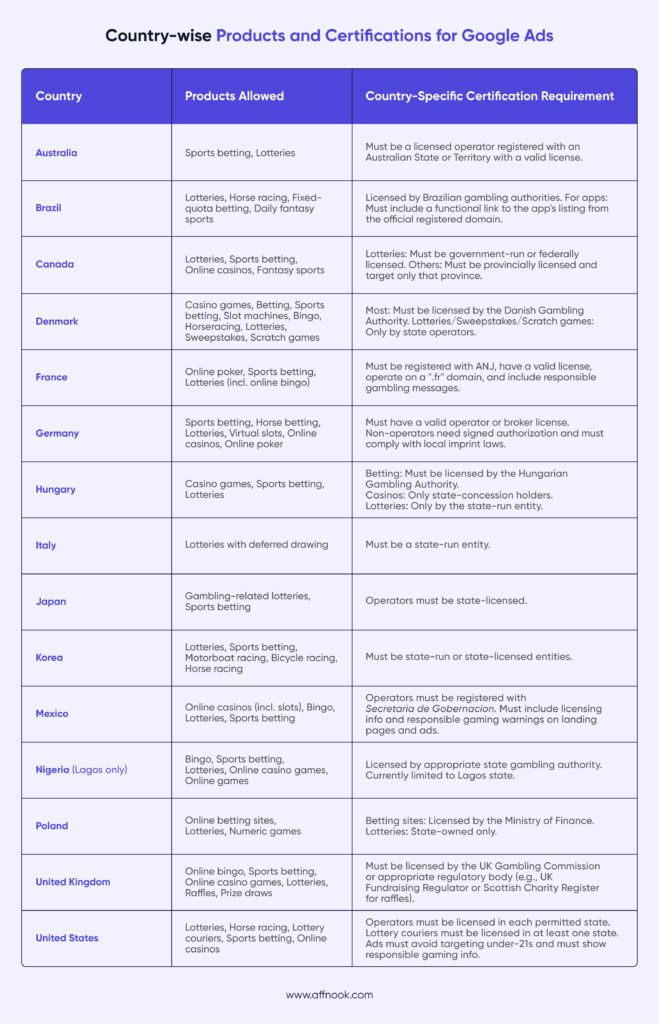
What Can You Do About Online Gambling Google Ads Violations?
Seen an ad running, which should be disallowed? You can simply report it. Such actions can also be carried out against your ad if they’re falling outside set norms.
How do these limitations operate?
- If your ad or creative asset is restricted, you may have to evaluate if some aspect of it, such as image, headline or landing page is the cause. You’ll be given a reason by Google (as is policy) and once that given aspect is fixed, the ad will be eligible and run.
- If you’re facing an account suspension, you can consider the restriction more widespread. This could be happening due to multiple violations or a serious violation (like submitting false information or trying to get ahead of policy norms). This should also be a warning bell for you: Google can permanently choose to not advertise from you. What’s more? Associated accounts too could be getting impacted by this treatment.
Summing Up
High stakes, high reward. That’s how many would describe the experience of running ads on Google, especially in tricky niches like iGaming.
The opportunities emerging from online gambling Google ads are immense. But so are the risks. Rigid ad restrictions can seem like a thorn in your side. It can be even more difficult for online casinos hosting social casino games.
However, adhering to the golden rule can ensure nothing goes wrong. What’s this rule? Certification, transparency and knowing that rules are ever evolving, and what is okay today may not be tomorrow.
Help Centre
How can iGaming operators get certified to run Google Ads for online gambling in regulated countries?
To obtain certification, make sure you’re clear on whether you’re running an iGaming business or a social casino, or which one you’re looking to run ads for. Then you can visit the Google Ads Help Centre and submit an application for each country you want to advertise in. Before submitting, ascertain whether your business is licensed to operate in all the applicable countries and whether you’re meeting all local legal requirements.
Please note that certification for online gambling Google ads is not permanent, and may need to be re-done if any aspect of your business changes.
What are the Google Ads casino policy requirements for promoting online gambling in Europe and North America?
Online gambling ads run on Google in Europe and North America must meet the following requirements:
- Be served by you only in permitted or certified countries,
- Be shown to only 18+ users (and include disclaimers on this targeted),
- Redirect to landing pages which come with responsible gambling warnings, and
- Are being run for licensed business that follow local laws.
In the USA, there are variations in what is allowed within each state. In Europe, this applies based on the
Can online casinos advertise through Google Ads without a gambling license in regulated markets?
Absolutely not. A valid license is a must for even obtaining Google’s certification to even run online gambling Google ads. The organization places strict emphasis on local regulations and their obedience to be able to advertise through them. If your license is expired, suspended or terminated while running campaigns, you must pause them and notify Google at the earliest. Not doing so will result in your ads account being suspended too.
What types of online gambling ads are allowed on Google in countries like the UK, Canada, and India?
In Canada and the UK, operators and brands can promote real-money gambling, including casinos, poker and sports betting (provided they meet all policy norms laid down by Google). In India, only limited formats are accepted, such as ads to promote daily fantasy sports.
While setting up your Google ads campaigns, it is crucial to make note of the permitted formats for the country or countries you’re targeting so that your ads may run without a hitch. In case of violations, you can modify campaigns to get them up and running once again.
Why was my online gambling Google Ads account suspended and how can I appeal or fix it?
Account suspensions are a last resort and usually happen when policy violations are grave, such as promoting grey market businesses or using misleading ad creatives. However, it is also possible your ads have been reported, and are therefore, flagged by Google.
The good news is that you can contest violations and reverse the suspension using the following steps:
- Review the reason provided by Google (in your account dashboard).
- Audit your creatives, landing pages and compliance documentation.
- Correct all evident violations and get re-certified by Google.
- Submit an appeal in Google’s Help Centre for a reevaluation.
Repeat suspensions can lead to a permanent suspension so it is important to be careful when running ads for online gambling through Google.
